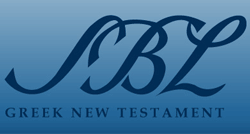 Wow!
Wow!
The Society for Biblical Literature released a new text. While it may not seem big to most people, for biblical scholars, this may mark a critical point in the influence of technology on biblical studies as an academic discipline.
To paint a picture, here’s how fast the field has advanced in the past 30 years:
- Prof. Margaret Mitchell, Dean of the University of Chicago Divinity School, wrote in the latest Circa that she used William Rainey Harper’s Greek textbook while studying for her PhD in the 1980s. (Harper died in 1906)
- I started using Greek computer software in my first year of undergraduate. I’ve never had a “pure” Greek education where I only used paper resources (note: completely tongue-in-cheek). In my 4 years of study, and 4 years now of non-study but casual reading, I’ve used two software packages, and I’m about to start using a third.
- Gramcord was the first. It was out of date, even when I started using it. But it was still exciting. Programmed by a true amateur (= one who loves it for its own sake), it didn’t need the latest bells and whistles of the newer operating systems to do its task. I especially liked the morphology searches – as Daryl Schmidt taught me to use them on one of my exegesis papers on Mark.
- Bibleworks was my second. Ironically, it’s a Windows-only piece of software that I used on my slow Macbook running Windows XP in Parallels. And even though it was slow, I loved copying and pasting to my note software (OmniOutliner). In my “Old Testament in the Gospel of John” course, Prof. Klauck pointed that we could go through more of the cross references because I was quickly able to find some of the obscure books. Bibleworks was powerful, but I didn’t need it for most of its power. The only time I taxed its processing power was to look up every reference of “ego eimi + article + participle” in its massive library of texts.
- I’m looking for new software, but can’t decide which to pursue. I’m working on so many different computers and platforms that none of them quite fit. Heidi uses OliveTree reader on her iPad. I’m looking at Logos and Accordance for my Mac, but am not willing to drop that amount of money for a software-based system. I’m even considering a hybrid approach of Bibleworks on my Windows laptop and setting up a web service to pull texts when I need them. (Although that would probably violate Bibleworks’ Terms of Service).
- Until this SBL announcement, the current frontier I saw in technology for Biblical Scholarship was to complete the transition to Unicode formatting for texts. I didn’t even know the SBL had a font (I’d always previously Gentium from SIL).
- Now I’m wondering if the next frontier for technology in Biblical Scholarship will come from the computer science field. One of my classmates in undergraduate studies at TCU is now doing his PhD at Carnegie Mellon and working on advancing language-analyzing supercomputer systems. We may come to know more about the rhetorical patterns and wide variety of influences in the Hellenistic world from the studies of computer scientists than those of Biblical scholars.
What I find super-interesting about this announcement is that the SBL paired up with a commercial group to release the text. Logos is a player, no doubt about it. But I wonder what percentage of SBL members actually use Logos. Those market share numbers would be interesting.
And I’m also thrilled that the released the raw text for free so other Bible software programs could use it. Michael Hanel already ported the new critical text over to Bibleworks.
But now I wonder: is this just an opening in the floodgate of Biblical Criticism texts? No doubt the Jesus Seminar could release the critical text they made for their latest project, The Authentic Letters of Paul? Could each school create their own text? I’m not saying the Nestle-Aland/United Bible Societies (and in particular the German Bible Society) should have priority or special ownership of the most commonly used edition. But how will this release change scholarship?
Will it become as fragmented as our modern political discourse? Will certain text choices shut off discussion amongst scholars?
In any case, the more accessible and high-quality texts, the richer the discussion. I’m excited to start looking at some of the variances.







Speak Your Mind
You must be logged in to post a comment.